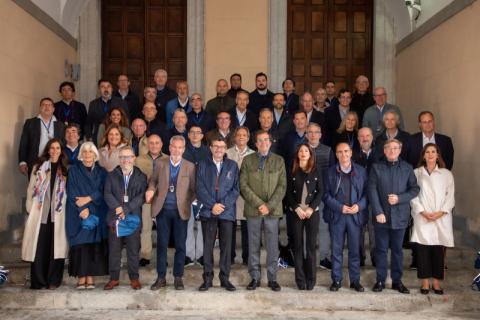
Puertos del Estado and the 28 port authorities give a key boost to the Strategic Framework
- They engage in a two-day discussion on sustainability and energy transition, human resources, and governance.
- The president of Puertos del Estado emphasizes "the importance of open and constructive dialogue to advance the transformation of the ports".
20-09-2024 (Puertos del Estado Public Entity). Puertos del Estado and representatives from the 28 Port Authorities gathered for a two-day meeting to agree on updates to the inter-port compensation and land accessibility funds, and to outline the steps toward 2030 in line with the Strategic Framework of the national port system.
Key topics discussed included improving the contribution of the state-owned port system to a more prosperous and balanced society, enhancing competitiveness and efficiency, addressing environmental sustainability and the energy transition, governance, and human capital, which plays a crucial role in the effective operation of these hubs amidst global uncertainty.
Álvaro Rodríguez Dapena, president of Puertos del Estado, highlighted "the importance of maintaining an open and constructive dialogue to continue transforming Spanish ports into more sustainable (socially, economically and environmentally), digital, innovative and safe ports" as outlined in the Strategic Framework approved in late 2022.
On sustainability, projects such as OPS (Onshore Power Supply) to provide electricity to docked ships, thereby reducing emissions and noise, were emphasized, as well as the shift toward alternative fuels and energy efficiency measures implemented by the Port Authorities. The discussion also addressed the significant challenges these initiatives pose and the best ways to implement them.
In the human resources domain, the need for training tailored to new roles and needs was underscored.
Regarding port governance, the president of Puertos del Estado informed the presidents and directors of the Port Authorities about the initiation of a global analysis of port governance, aimed at establishing a comparison with the Spanish case. This study, expected to be completed in about a year, will examine specific aspects of the organizational and governance structures of different countries, as well as the development of infrastructure and regulation and provision of port services.
On Thursday afternoon, Benito Núñez, the General Secretary of Air and Maritime Transport, and Gustavo Santana, the Marina Mercante managing director, shared with the port system representatives the current challenges facing the maritime sector and the policies being implemented to address them.
INTERPORT COMPENSATION FUND
During this meeting, the Interport Compensation Fund Distribution Committee also convened. This mechanism allows for the redistribution of resources within the national port system based on needs, and is directed toward areas such as navigation aid, island support, security, and other unforeseen criteria. The Committee approved the final distribution proposal for 2024 and the initial proposal for 2025, maintaining the contribution percentage from the Port Authorities at 5%, and for the Port Authorities of the Canary and Balearic Islands, Ceuta, Melilla, and Seville at 2.5%.
The initial distribution proposal for 2025, as established by the Consolidated Text of the Ports of the State and Merchant Marine Law, allocates resources to navigation aid (€9.7 million), Port Authorities with special isolation, insularity, and ultra-peripheral conditions (€10.7 million), safety operations (€1.6 million), the Puertos 4.0 Fund (€12.5 million), and other criteria as per article 159.5 b) (€20.2 million).
The Committee also approved the updated action program for the Port Land Accessibility Financial Fund derived from the 2025 Business Plans, as well as the Fund's budget for the coming year. The Fund will now include 60 actions representing a total investment of €1.87 billion, with a maximum contribution of €837.4 million from resources generated by the public port authorities.

